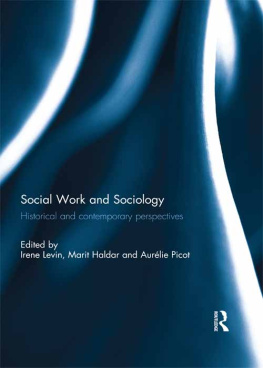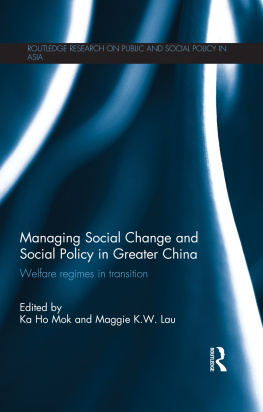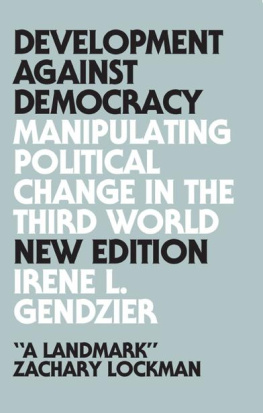
Managing Political Change
Also of Interest
The Gap Between Rich and Poor: Contending Perspectives on the Political Economy of Development, edited by Mitchell A. Seligson
Comparative Development Perspectives, edited by Gustav Ranis, Robert L. West, Cynthia Taft Morris, and Mark Leiserson
Theories of Development and Underdevelopment, Ronald H. Chilcote
From Dependency to Development: Strategies to Overcome Underdevelopment and Inequality, edited by Heraldo Muoz
Threat to Development: Pitfalls of the NIEO, William Loehr and John P. Powelson
Theories of Comparative Politics: The Search for a Paradigm, Ronald H. Chiicote
Dependency and Marxism: Toward a Resolution of the Debate, edited by Ronald H. Chilcote
Issues in Third World Development, edited by Kenneth C. Nobe and Rajan K. Sampath
Unfinished Agenda: The Dynamics of Modernization in Developing Nations, Manning Nash
Comparative Social Dynamics: Essays in Honor of S. N. Eisenstadt, edited by Erik Cohen, Moshe Lissak, and Uri Almagor
Available in hardcover and paperback.
Westview Special Studies in Social, Political, and Economic Development
Managing Political Change:
Social Scientists and the Third World
Irene L. Gendzier
For nearly three decades, policymakers and students have been concerned with Third World societies in transition. Conventional interpretations of political change, formalized in studies of political development, have dominated approaches to analyzing such changes. Yet, argues the author, these interpretations have been justly criticized as bankrupt and irrelevant to Third World realities. Why are they reproduced? How can one explain the belief that these approaches remain viable? These are some of the questions addressed in this wideranging review of the literature of political development and the paradigms that have guided analysis of political change over the past thirty years.
Examining how political development theories are rooted in U.S. foreign policy, domestic political trends, and changes in postwar political science, Dr. Gendzier grounds the traditional approach to political development in recent history and politics. Her analysis raises questions about how development doctrine is related to foreign policy, as well as noting development theory's debt to cold war ideology and revisionist theories of liberal democracy. Dr. Gendzier's interpretation sheds light on the reasons for the current theoretical bias that favors approaching politics in terms of psychology and culturean approach that, she states, has had devastating effects on our understanding of politics.
Irene L. Gendzier is a professor in the Department of History at Boston University, where she is an associate in the African Studies Center and a lecturer in the Department of Political Science. She is also a research associate at the Center for Middle Eastern Studies, Harvard University. Her publications include The Practical Visions of Yaqub Sanu (1966), A Middle East Reader (1969), and Frantz Fanon: A Critical Study (1973; 2nd ed., 1984).
Managing Political Change: Social Scientists and the Third World
Irene L. Gendzier
First published 1985 by Westview Press, Inc.
Published 2018 by Routledge
52 Vanderbilt Avenue, New York, NY 10017
2 Park Square, Milton Park, Abingdon, Oxon OX14 4RN
Routledge is an imprint of the Taylor & Francis Group, an informa business
Copyright 1985 Taylor & Francis
All rights reserved. No part of this book may be reprinted or reproduced or utilised in any form or by any electronic, mechanical, or other means, now known or hereafter invented, including photocopying and recording, or in any information storage or retrieval system, without permission in writing from the publishers.
Notice:
Product or corporate names may be tradmarks or registered trademarks, and are used only for identification and explanation without intent to infringe.
Library of Congress Cataloging in Publication Data
Gendzier, Irene L.
Managing political change.
Includes bibliography.
1. Developing countriesPolitics and government.
2. Developing countriesResearchUnited States.
3. Political scienceUnited States. I. Title.
JF60.G46 1985 320.9172'4'07 84-10692
ISBN 13: 978-0-367-00537-5 (hbk)
For A.J.K.
This study grew out of an interest in the impact of Modernization and Development theories on the contemporary study of the Middle East. That interest remains. In fact, I am persuaded that the dominant interpretations of Middle East studies in the years since World War II in the United States can be explained in terms of their conformity to the prevailing paradigms associated with Modernization and Development studies.
As research on this project progressed, its direction changed. Increasingly, attention was focused on the domestic roots and foreign policy framework relevant to the emergence of Development studies in general. But Middle East research continued to influence this project. It was the predicament of Middle East studies, in which conventional interpretations continued to dominate, that led me to question the extent to which such interpretations had been eclipsed in the study of Third World states. Radical critiques appeared to have bypassed those concerned with the Middle East, at least among established scholars. The situation changed, in part, because of the upheavals that occurred in the area itself over the last decade. But in comparison with Latin American, Far Eastern, and African studies, research into contemporary Middle Eastern societies revealed the continuity of interpretations that had been rigorously questioned and undermined in other fields. This continuity, I concluded, merited far more consideration than it had thus far received. Moreover, it had the effect of tempering the conviction expressed by some critics that conventional views of Third World societies were a thing of the past.
How widespread was the change that came about in Third World studies as a result of the radical critiques associated with dependency and postdependency scholarship? I would argue that for many consumers of the media it is the conventional interpretations that continue to dominate. Far from being perceived as "interpretations" of the world, they are viewed as merely expressing the common-sense view of politics and society. In that sense, they appear to require little questioning. The extent to which popular, as well as specialized, discussions of the Third World continued to invoke the language and concepts of Development struck me as warranting further study, particularly insofar as such concepts distort rather than illuminate the analysis of political change.
Such an inquiry proved to be no small undertaking, just how extensive it was to be I was, fortunately, as yet unaware. As the project evolved, the number of subjects that seemed relevant increased. From foreign policy to domestic politics, from the role of intellectuals to the place of the academy, from the changing nature of political science to the meaning of social science, from the voluminous literature produced by conventional scholars of Development to the prolific output of those who challenged the conventional approacheseach subject deserved a separate volume.











